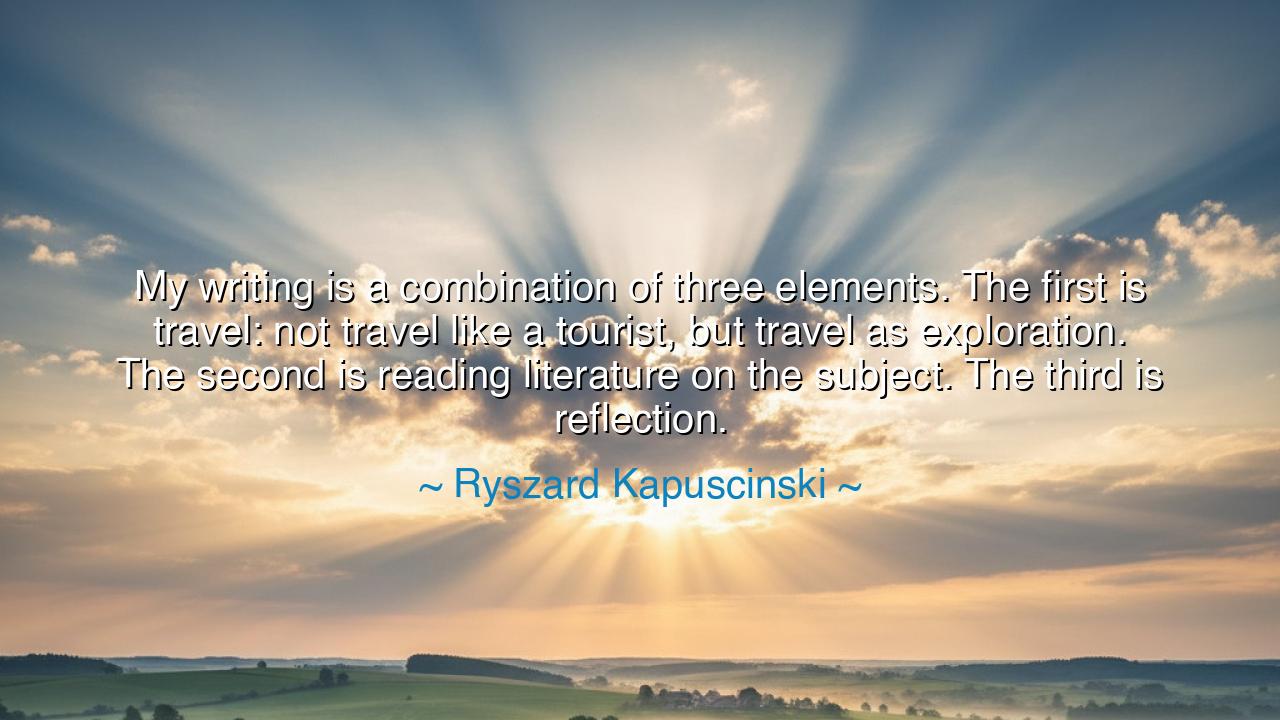
My writing is a combination of three elements. The first is
My writing is a combination of three elements. The first is travel: not travel like a tourist, but travel as exploration. The second is reading literature on the subject. The third is reflection.






"My writing is a combination of three elements. The first is travel: not travel like a tourist, but travel as exploration. The second is reading literature on the subject. The third is reflection." Thus spoke Ryszard Kapuściński, chronicler of nations, wanderer of lands, and witness to the shifting tides of history. In these words, he unveils the alchemy of his craft, revealing that true writing is not born of fancy alone, but forged from experience, knowledge, and meditation. Each element is a pillar, and without all three the house of wisdom collapses.
The first element is travel, not the shallow glance of the tourist, but the deep gaze of the explorer. The tourist passes through lands, gathering images and tokens, while the explorer enters the marrow of a place, seeking to know its people, its struggles, its soul. Kapuściński walked through Africa, Asia, and Latin America not as a detached visitor, but as one who listened, who lived among the people, who drank from their cups and suffered their hardships. He teaches us that true understanding comes only when one dares to leave the safety of distance and step into the living heart of the world.
The second element is reading—the wisdom of others gathered across time. For what the traveler sees is vast, but incomplete, and without the voices of those who have walked before, the explorer may lose his way. Literature deepens perception, offering context, history, and insight into what the eyes cannot immediately grasp. Just as the generals of Rome studied the campaigns of their ancestors, and the philosophers of Greece read the scrolls of Egypt and the East, so too must the writer ground his vision in the thoughts and records of those who came before. Reading is the second eye that allows the traveler to see in depth.
The third element is reflection—the turning inward of the soul upon what it has seen and read. For without reflection, knowledge is noise and experience is chaos. Reflection is the fire that burns away triviality and leaves only truth. The monk in his cell, the thinker by the river, the elder beneath the tree—all knew that wisdom is not simply lived or learned, but distilled in the silence of contemplation. Kapuściński reminds us that writing, if it is to carry weight, must pass through this crucible of reflection, where understanding becomes meaning and fact becomes insight.
History offers us examples of this triad. Herodotus, called the Father of History, traveled among many lands, recording the customs of nations. Yet he also read and listened to the stories of others, and then reflected deeply before committing them to his work. Likewise, Marco Polo explored the East, but his tales gained power because they were later studied, ordered, and contemplated. In each case, greatness arose not from a single element, but from the combination of exploration, study, and reflection—the very path Kapuściński lays before us.
There is also humility in these words. For the modern age tempts us to believe that seeing alone is enough—that photographs and fleeting impressions are truth. But Kapuściński rebukes this, teaching that truth requires patience. To travel without reading is to be blind to the depths; to read without traveling is to be untested by reality; to do both without reflection is to remain shallow. Only by weaving the three together can one hope to approach wisdom.
O children of tomorrow, take this teaching to heart: if you wish to understand the world, do not settle for the surface. Travel, not as a tourist, but as a seeker. Read, not merely for amusement, but for depth and context. And reflect, so that what you have gathered does not scatter like leaves in the wind, but settles into the soil of wisdom. This triad will serve you in all things—not only in writing, but in living itself.
Thus the teaching of Ryszard Kapuściński stands as a lamp for all seekers: the path to truth is not quick, nor easy, but requires movement, learning, and contemplation. Walk this path, and your words—and your life—will carry the weight of authenticity, the fragrance of understanding, and the fire of wisdom.






AAdministratorAdministrator
Welcome, honored guests. Please leave a comment, we will respond soon